Jammu and Kashmir has been in a constant state of turmoil and it has paralyzed the various socioeconomic structures of the erstwhile state. The formal education sector has also suffered disruptions due to the challenges posed by one conflict after another. However, amidst all this, one section of the society has been bearing the brunt of suppression and marginalization in terms of their basic rights and access to necessary resources.
It is more than just a conjecture to believe that the children from the lower most socioeconomic strata of the society are severely underrepresented in the education sector at present. The need for breaking the prevalent barriers to provide equitable access to education to all sections of society is legitimized under the Right to Education Act. However, in order to bridge the gap between the reality and the larger goal behind this legislation, active community participation is the need of the hour.
Meenu Padha, an advocate by profession, is the co-founder of “Masti ki Pathshaala”. Based in a remote district of Jammu, Meenu describes this school as an “informal evening school” set in a government school building provided by the Directorate of School Education, Jammu. Meenu established this school along with her brother Nikhil Padha. The journey of “Masti ki Pathshala”, started with only 2 children studying in the backyard of Meenu’s home. Two years later, the strength of the classroom has grown to 40, with students ranging from 5 to 15 years.
“All of these children do not belong to any government school also. They are involved in rag picking and don’t know how to write or read. My aim is to provide at least the basic education to them” says Meenu while describing the need for education for these children.
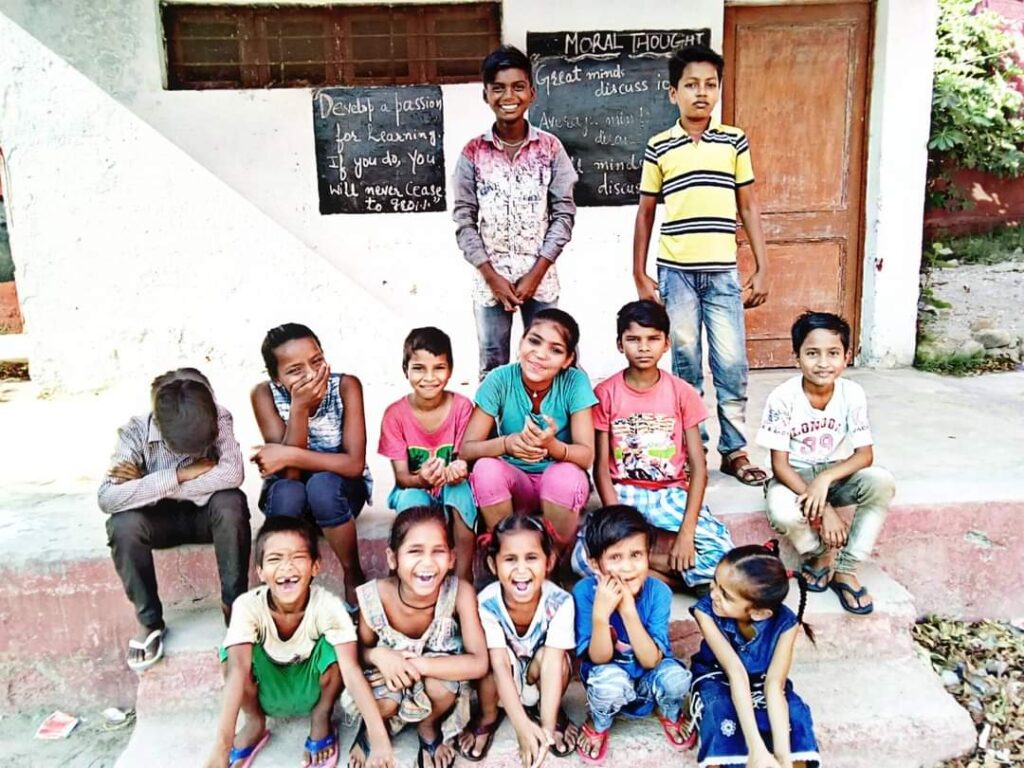
However, Meenu says that some of the students around the age of 14 to 15 years had enrolled in government schools but had to drop out due to unforeseen circumstances. According to Meenu, some of the students also belonged to the families that migrated to the district of Jammu from other parts of the country. However, the one thing that lies common among them is the lack of necessary basic resources to avail their right to compulsory education.
Creating an environment of growth
Established in 2018, the primary goal of the initiative of “Masti ki Pathshala” lies in providing the basic education and skills to the students by working for their mental, physical and intellectual development amidst the constant daily struggles of the society. The classes involve subjects such as written and spoken English, Art, Math, basic Science and Social Science. Teaching the students of a wide age group of 5 to 15 years takes a different approach to teaching. Meenu has divided the curriculum of the students based on their ages and attempts to provide equal attention to every student in the class.
“If a child is 5 years of age, then rhymes, poems and songs are taught. For the students of 6-7 years, basic lessons on writing alphabets are given and for the students of 14-15 years books related to basic science and social science are also provided.” says Meenu.
The books for the same were provided by the Government of Jammu under the Sarvshiksha Abhiyaan and have been a great resource in maintaining the school.
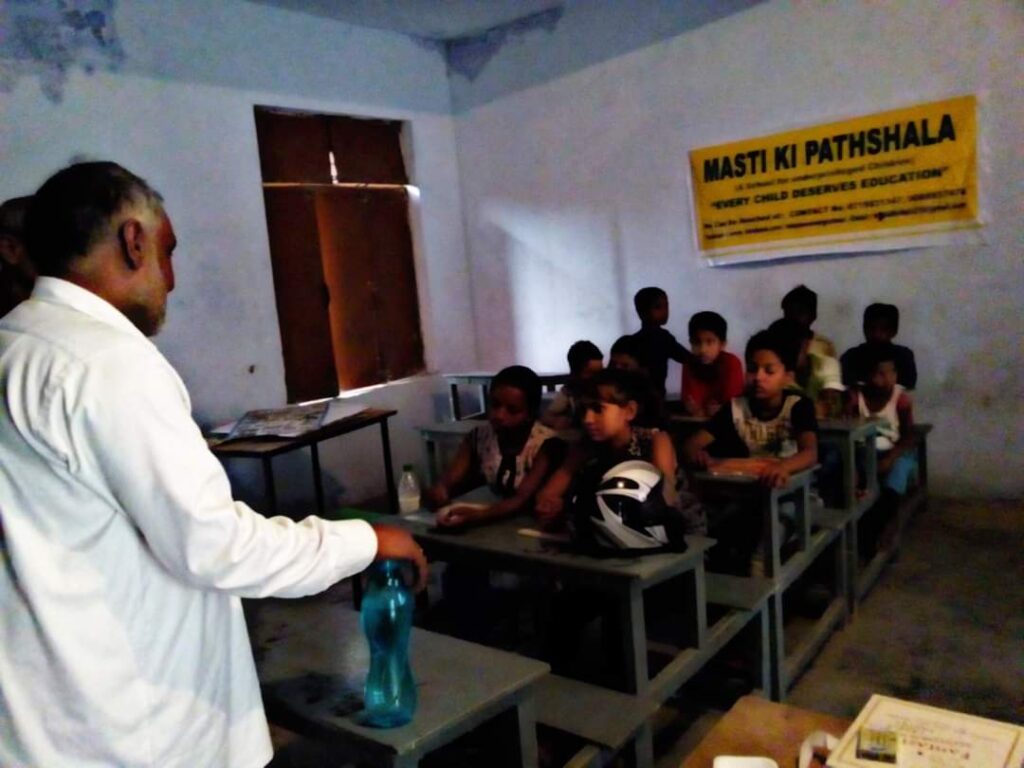
As Meenu tells it, the colleagues of Meenu and Nikhil Padha have been generous enough to offer their expertise in teaching different skills such as arts, dance and music to the students.
“Some of my colleagues give them guitar classes, or classes in art and crafts to keep them interested in coming here and teach them new skills as well” Meenu says, talking about the contribution of her colleagues.
As recounted by Meenu, one day a week is also allotted to physical activities and different games for the students so as to keep the students active. Sometimes cricket or football matches are also organized in the playground of the Government School allotted to them for conducting the classes and various activities.
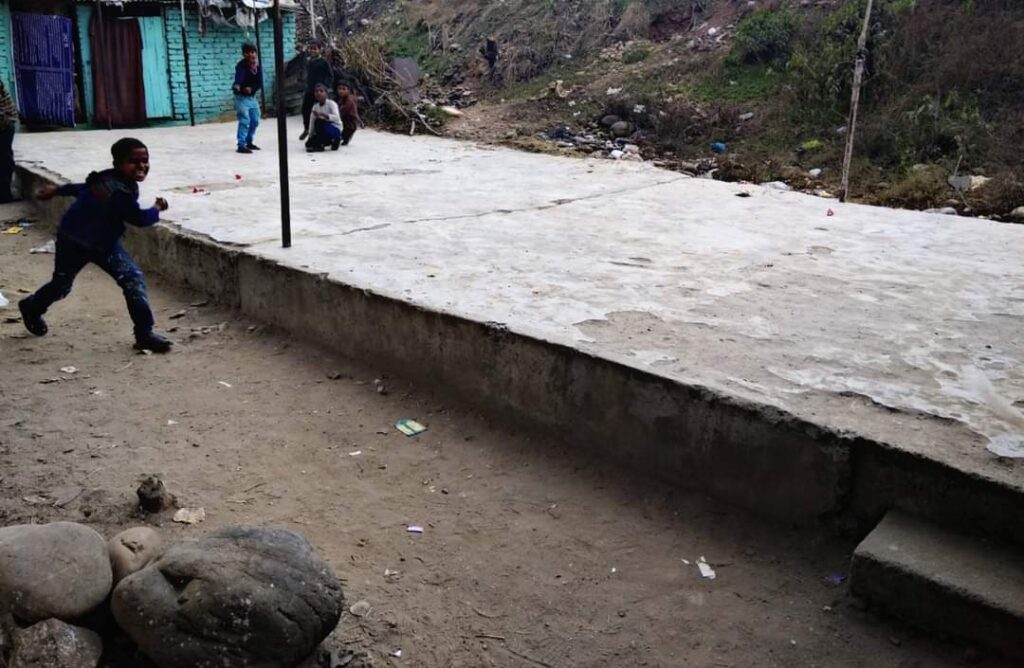
Meenu aims to formalize the education of these students under the Right to Education Act by getting them allotted to different classes in the Government Schools based on their age groups.
“I want the students to become capable of writing and reading so that I can get them enrolled to the nearby Government schools” says the advocate.
Meenu describes that her main tool is invoking the Right to Education Act to get the students allotted to these government schools free of cost. “
“A larger aim is also to formalize the school altogether in the future because now I have started getting the required support. However, that is a long road ahead.” Meenu says while talking about the future of the school.
She also aims to set up various branches of Masti ki Pathshaala in every district of Jammu and Kashmir. Meenu dreams to create a network of Masti ki Pathshaala schools and volunteers who would offer their services to these children free of cost.
The challenges ahead
Opening and maintaining an informal school in a remote district like Jammu comes with its own set of challenges. The primary challenge, as Ms. Meenu describes it, lies in making the parents understand the value of education for their children.
“Convincing the parents for the education of the students was the biggest challenge”
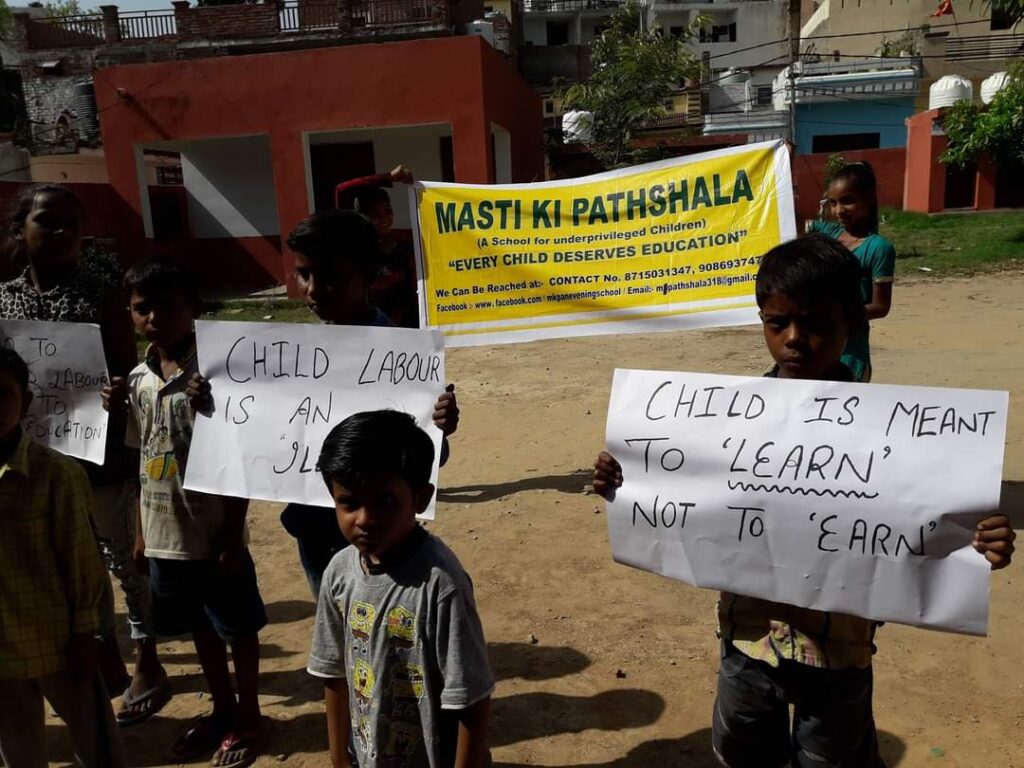
The students, coming from the lower socioeconomic section of the society, are usually a source of income for their families and hence the parents become reluctant to send them to school.
Another major challenge has now been instigated by the pandemic. The lockdown brought about in the midst of the Covid 19 pandemic has halted the daily functioning of the school and since the students are not equipped with the necessary digital means, holding regular classes would become a health risk.
“It has been 6-7 months since the classes have stopped because the students don’t have the electronic devices to conduct classes online. I have given them the books to study but the classes have not been happening”
Meenu also narrates that apart from organizing a few monthly drives to distribute books, blankets and other essentials, the primary functioning of the school has been halted for the time being.
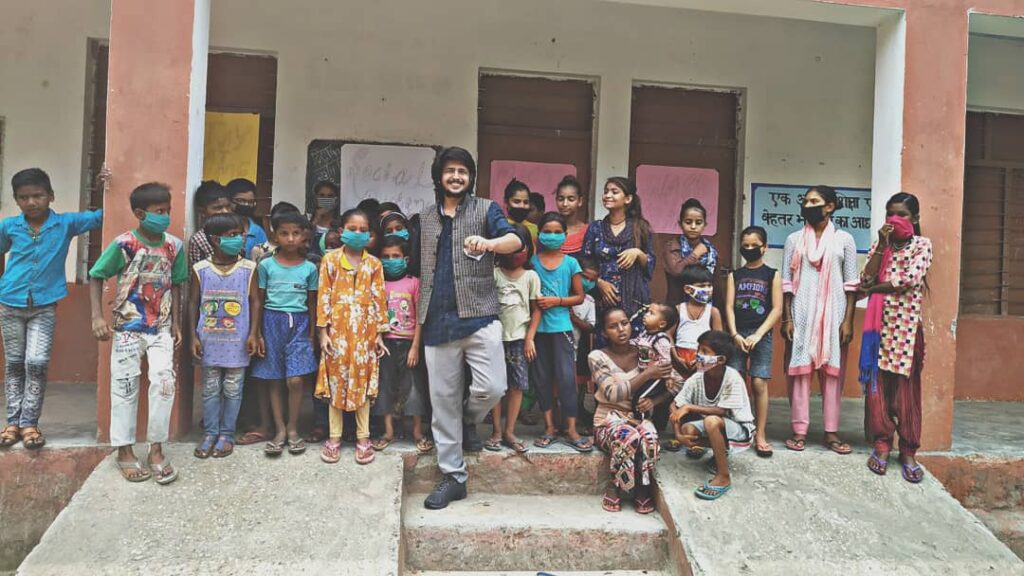
A looming challenge also lies in the sphere of funding for the school and the essentials. As of now, the school is primarily self-financed by Meenu, her brother Nikhil Padha and some of their colleagues.
“If you ask me about formal funding, then we are not receiving any formal funding as of now. My brother and I finance the required essentials.”
Even though the stationary essentials and daily requirements are often taken care of, there is a growing need to find avenues for generating funds as more and more students have started getting admitted.
The conflict ridden socio-political circumstances pose another challenge that needs to be addressed on a daily basis. It adds to the layers of barriers that need to be shattered in order to improve the situation of education in the district.
The Motivation Behind
When asked about what drove and motivated Meenu towards opening this evening school, Meenu recounted her days of struggle.
“I am also from a middle class family and they have made a lot of sacrifices for my education. So I wanted to impart this experience to the children in need”
Starting the school with just 2 students, Meenu’s aim was just to give them some basic lessons for 2-3 hours in the evening.
“These children go to wash dishes with their mothers and try to earn money for their families. So my brother and I decided to teach the students in the evening because we cannot afford building a formal school at this point”
“I kept the news about this school in the public domain. Now after two years, a few people have started showing keen interest in contributing towards the school and teach the students various skills” Meenu says while recounting the journey of “Masti ki Pathshaala” so far.
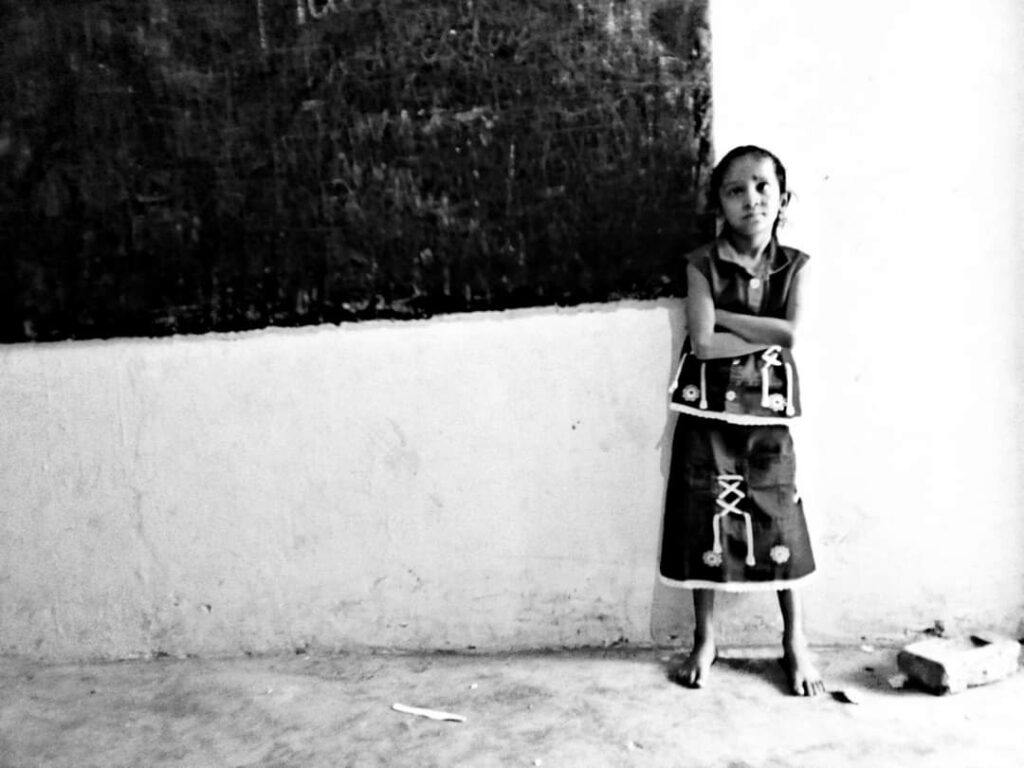
The potential for creating change
Amidst all of these prevalent challenges, Meenu remains hopeful for a better future for her Masti ki Pathshaala and all the brilliant students under its aegis. Hailing from a middle class family herself, Meenu has a powerful message to the youth of this country.
“The youth can become the most important change makers if they decide to be active and contribute towards the right cause. I believe education is the most powerful weapon and it can transform the state of the country”- Meenu Padha
With just 40 students in the school, Masti ki Pathshaala has become one of the most important initiatives in the district of Jammu to contribute towards the implementation of the Right to Education Act. Meenu’s small initiative holds immense prominence and power in a region like Jammu and Kashmir where education can be the only tool to counter the contentious socioeconomic situations. Hence, with the proper support from the government and the required financial assistance, the medium of education can be used to reform the condition of a society that is largely paralyzed by the persistent tensions.


